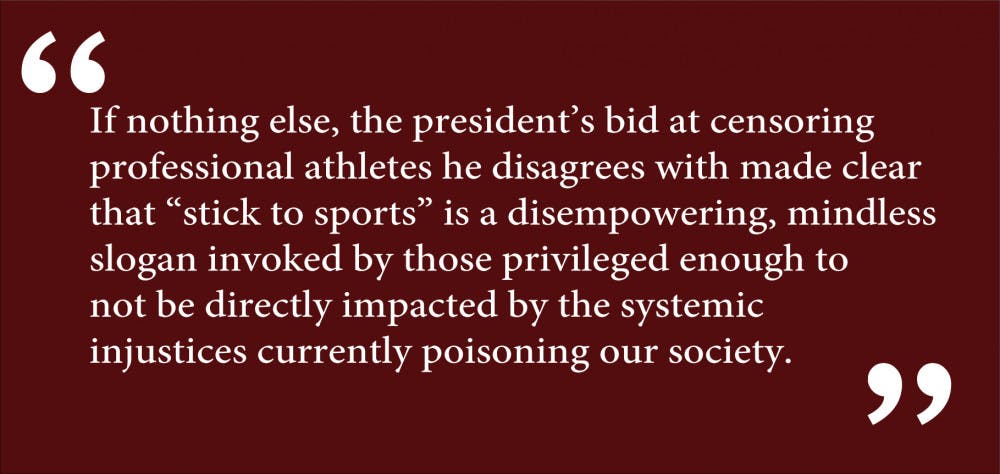If it wasn’t obvious before, it has now become clear: “Stick to sports” is nothing more than a hypocritical tool used to undermine the political participation of athletes.
For the uninitiated, “stick to sports” is a common criticism aimed at sports reporters and athletes who wade into political territory with their columns or public statements rather than settle for analysis focusing on defensive schemes, salary caps and the latest trading block buzz.
It’s a simplistic concept that doesn’t make any sense. “Stick to sports” suffers from a crippling logical failure: After all, the very act of attempting to police what people say is profoundly political. More importantly, “stick to sports” naively assumes that sports naturally exist in some apolitical bubble that only gets punctured when journalists or athletes go out of their way to pursue a political agenda. But this is blatantly not the case: The structure of the professional sports leagues and the NCAA engenders class warfare waged between the leagues’ players and their wealthy capitalist owners. The underrepresentation of people of color and women in high-level front office positions within sports franchises is a concrete manifestation of a culture that continues to systematically favor white men. The mere two-game suspension Ray Rice received in 2014 for sucker-punching his girlfriend revealed the NFL’s apathy regarding domestic violence. I could go on, but the point is clear: Sports are about people, and anything involving people is political.
There has been, of course, very little sticking to sports recently. Last fall, Colin Kaepernick began kneeling during the national anthem before each game in protest of police brutality, a demonstration other NFL players have joined in on this season even as Kaepernick remains a free agent. Then, during a speech in Alabama two weeks ago, President Trump recommended NFL owners deal with players who kneel by getting each “son of a bitch off the field” and firing them. NFL Commissioner Roger Goodell and several owners, including Trump’s friend Robert Kraft, criticized the president’s comments. Three teams — the Pittsburgh Steelers, Seattle Seahawks and Tennessee Titans — refused to take the field for the anthem on Sept. 24 in protest. That same weekend, Trump rescinded the NBA champion Golden State Warriors’ invitation to Washington, D.C., after star guard Stephen Curry had announced he didn’t want to celebrate his team’s championship at the White House due to the president’s beliefs.
If nothing else, the president’s bid at censoring professional athletes he disagrees with made clear that “stick to sports” is a disempowering, mindless slogan invoked by those privileged enough to not be directly impacted by the systemic injustices currently poisoning our society.
And don’t expect the players to pipe down any time soon: Trump is now the biggest story in sports, and if the past few weeks are any indication, the jocks seem poised to lead the resistance.
While it’s true that sports have always been inescapably political, we find ourselves at a particularly delicate moment — a time when the politics of the athletes in America’s favorite sports leagues, the diverse NBA and NFL, are inevitably clashing with the values held by our president. Let me be clear: Most of Trump’s actions throughout his adult life — from his 1989 ad campaign to have the “Central Park Five” executed to his “very fine people” comment in the wake of Charlottesville — suggest that he, at the very least, sympathizes with white supremacy.
The black athletes who populate nearly three-quarters of the NBA and NFL rosters are uniquely equipped to protest such bigotry, even as so-called “real Americans” denigrate them as unpatriotic, ungrateful “brats,” to quote the comments section of the right-wing website The Blaze. Sport is one of the few spheres of life where African Americans have a platform large enough to shape public discourse regarding racial inequality.
But even as we elevate black superstars like LeBron James for the entertainment value they provide us, we invalidate those same athletes’ political views by telling them to “stick to sports” and intentionally misrepresenting their positions.
We insist on calling the anthem protests disrespectful to our military and country even though they are explicitly not anti-military or anti-American demonstrations, but seek to emphasize the racial injustice of police brutality in a peaceful and profoundly American way. We insist on referring to the legitimate concerns of black athletes as “petulant” and “whin(y).” And we insist on rationalizing the blackballing of the NFL’s Colin Kaepernick, a man guilty of having the nerve to underscore the systemic injustice perpetrated against black men in the United States by refusing to stand for an anthem that — lest we forget — honors the flag of a country founded on the enslavement of his ancestors.
That type of rhetoric serves no purpose other than to deny athletes their basic humanity. But the events of recent weeks have proved that players recognize the folly of sticking to sports in a country that has permitted the rise of Trumpism, and they appear united in the effort to dismantle both the credibility of this president and the pervasive racial biases that have plagued the United States since its inception.
Sports have finally embraced the resistance — and all because Donald Trump couldn’t stick to politics.
Sam Grigo ’18 is a Herald sports columnist and can be reached at samuel_grigo@brown.edu. Please send responses to this opinion to letters@browndailyherald.com and other op-eds to opinions@browndailyherald.com.





